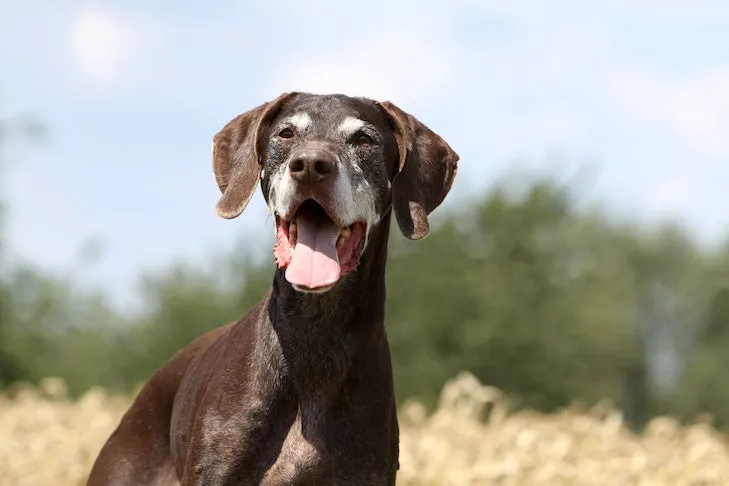As dogs age, their dietary requirements evolve, necessitating a shift in their food choices. The transition to senior dog food is crucial, as the food that has served them well throughout their adult lives may no longer be optimal. This can be due to a decreased appetite, dental issues that make chewing difficult, or simply changing metabolic needs. Selecting the right food for your senior dog can seem daunting, especially since official dietary guidelines for aging dogs are not as clearly defined as for other life stages by organizations like AAFCO. However, understanding a few key factors can help you navigate the options and ensure your canine companion receives the best nutrition possible.
Understanding Senior Dog Food Options
Practical considerations play a significant role when choosing food for older dogs. Dental problems can make chewing tough kibble uncomfortable or even painful. Very old dogs may also experience a diminished appetite. To entice them, gently warming their food can enhance its aroma, while cooling it might be beneficial for dogs with sensitive stomachs or frequent nausea.
Dry Dog Food for Seniors
While dry dog food is a staple for many dogs, it’s not always the ideal choice for seniors. The hardness of kibble can pose challenges for dogs with dental issues. Opting for smaller kibble sizes can make it easier to manage, and adding water to soften the kibble can also improve palatability and digestibility. Despite these potential drawbacks, dry food offers benefits, such as the abrasive texture helping to reduce plaque and tartar buildup on teeth. It can also be conveniently used for training or as a healthy alternative to traditional treats.
The Benefits of Wet Dog Food
Wet or canned dog food is an excellent option for senior dogs, particularly those experiencing dehydration or dental difficulties. Its high moisture content aids in hydration, which is essential for older dogs who may not drink as much water as they used to. The soft texture makes it easy to chew, making it a suitable choice for dogs with missing teeth or other oral health concerns. Furthermore, wet food generally contains fewer calories than dry food due to its higher water content, which can be beneficial for weight management. [cite:0, cite:1]
 Spaniel spoon
Spaniel spoon
Specialized Diets for Senior Dogs
For senior dogs with specific dietary needs or those who have developed sensitivities with age, a variety of specialized diets are available. These can include grain-free, organic, weight management, gluten-free, and veterinary prescription diets. If your dog suffers from food allergies or sensitivities, consulting with your veterinarian is crucial to identify the best food choices and ingredients to avoid. Additionally, consider the physical comfort of your senior dog while eating. Elevated feeders can help dogs who find it difficult to bend down, and encouraging them to eat while lying down might be necessary for some. If your dog’s appetite seems to be decreasing, discuss strategies with your vet to ensure they are receiving adequate nutrition.
Addressing Common Health Issues with Senior Dog Food
When selecting food for your aging canine, it’s vital to consider common senior dog health problems. These can include obesity, sensitive stomachs, arthritis, osteoarthritis, heart disease, and kidney disease. Many senior-specific dog foods are formulated with ingredients that help manage inflammation, maintain a healthy weight, and support the immune system. Some foods also focus on enhancing cognitive function, digestive health, joint mobility, and maintaining healthy skin and coat. For dogs with heart or kidney disease, a low-sodium diet is recommended. However, sodium levels can vary significantly even in senior dog foods. Similarly, for kidney disease, a low-phosphorous diet is important, though phosphorous levels are not always clearly indicated on labels and can be higher than in adult maintenance foods. Prescription diets are available for specific conditions like heart and kidney disease, but even these can have variations in nutrient content. Always inquire with the manufacturer about the nutritional details and the credentials of their formulation experts. If they cannot provide this information, it’s a strong indicator to seek an alternative product.

The Importance of Adequate Protein
Contrary to a common misconception, senior dogs do not require less protein; in fact, they often need more to support muscle maintenance. Muscle loss is a significant concern in older dogs, sometimes leading to an inability to walk unassisted. Veterinarian Ernie Ward suggests that senior dogs may need approximately 50% more protein than younger dogs to preserve muscle mass. Many adult maintenance diets lack sufficient protein to meet these increased needs. Dr. Ward recommends a protein content of 28-32% on a dry-matter basis for healthy senior dogs, especially those needing to lose weight.
Caloric Considerations for Senior Dogs
While younger seniors are often prone to being overweight, very old dogs may struggle with being underweight. Calorie content in senior foods varies widely, so it’s essential to choose a food that aligns with your dog’s current weight needs. A food that’s appropriate for weight loss might be detrimental if your dog needs to gain weight. Proactive calorie management throughout your dog’s life, starting in youth, can contribute to longevity and reduce the risk of illness.
Supplementation for Senior Dogs
Some senior dog foods incorporate supplements like glucosamine and chondroitin, intended to help manage osteoarthritis. However, scientific evidence supporting their efficacy is limited, though they are generally considered safe, albeit potentially costly. Omega-3 fatty acids, on the other hand, are thought to play a more significant role in senior diets, potentially aiding in the management of osteoarthritis and cognitive decline. If adding omega-3 supplements, aim for a combined EPA and DHA dosage of 700 to 1,500 mg, starting at the lower end and adjusting if digestive upset occurs.
 Senior German Shorthaired Pointer head portrait outdoors.
Senior German Shorthaired Pointer head portrait outdoors.
Transitioning to Senior Dog Food
Dogs spend the majority of their lives as adults, often eating the same food for extended periods. Gradually transitioning to senior dog food as their needs change is a critical step. A rapid switch can lead to digestive issues or reveal previously undetected allergies. A slow transition allows you to monitor your dog’s behavior, appetite, and stool, ensuring the new food is beneficial for their health and well-being, supporting a long and happy life.
